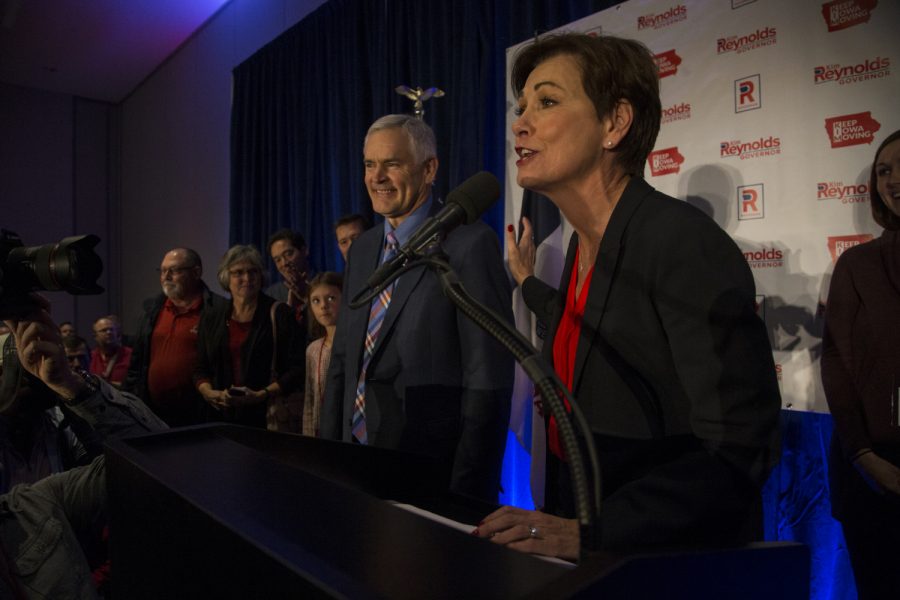Iowa Gov. Kim Reynolds won’t appeal ruling striking down fetal-heartbeat bill
Less than a month after a district court judge ruled Iowa’s fetal-heartbeat law violated the Iowa Constitution, Gov. Kim Reynolds, who championed the law, will not appeal the decision to a higher court.
Governor Kim Reynolds addresses her supporters at the Hilton in Des Moines on Wednesday, November 7, 2018. Reynolds defeated her opponent, Democratic candidate Fred Hubbell 50.19% to 47.61% with 92 counties reporting in an unofficial total.
February 18, 2019
Iowa Gov. Kim Reynolds announced Monday she would not appeal District 5c Court Judge Michael Huppert’s ruling that the 2018 fetal-heartbeat law violated the Iowa Constitution.
“This was an extremely difficult decision,” Reynolds said in a prepared statement. “… When I signed the Fetal Heartbeat bill last May, we knew that it would be an uphill fight in the courts that might take us all the way to the U.S. Supreme Court.”
The law, signed into law by Reynolds in 2018, would have banned nearly all abortions after a heartbeat could be detected, which can occur as early as six weeks into pregnancy.
In her statement, Reynolds said she saw no path to successfully appealing the district court judge’s decision after the Iowa Supreme Court ruled in June 2018 that a 72-hour waiting period for abortions violated the right to equal protection and due process under the Iowa Constitution.
“Rather than be distracted by a losing legal battle, now is the time to renew our focus on changing hearts and minds and to seek other ways to advance the cause of protecting the unborn in Iowa and around the nation,” Reynolds said. “I’m proud to lead the most pro-life state in the country and remain firm in my belief that all human life is precious.”
Pro-choice advocacy groups including Planned Parenthood of the Heartland, Iowa City-based Emma Goldman Clinic, and the American Civil Liberties Union of Iowa filed a lawsuit against the fetal-heartbeat bill soon after it was signed into law.
After a December 2018 hearing, Huppert released his ruling Jan. 22 that the Iowa law, which was supposed to take effect July 1, 2018 but had been put on hold during litigation, was unconstitutional.
Planned Parenthood of Iowa Executive Director Erin Davison-Rippey said in a prepared statement that
“The fact that this ruling will go without further legal challenge is a victory for every Iowan who has ever needed or will need a safe, legal abortion.”
In the statement, Davison-Rippey also referenced a series of bills in the Iowa Legislature that would change the way members of the state judicial nominating commission are selected. Opponents of the bills say the change would insert partisan politics into the judge-selection process.
“It is also a reminder that our fundamental Constitutional rights must be protected, and our judicial nominating process must remain intact, free from intrusion by partisan politicians,” Rippey said in the prepared statement. “Checks and balances live at the core of our democracy, and personal beliefs have no place in the state Constitution.”
Under current law, a 17-member nominating commission whittles down the number of judges to three, which the governor then selects to fill a vacancy on the Iowa Supreme Court or the Iowa Court of Appeals. The governor selects eight members of the commission that are then approved by the Senate, and Iowa attorneys select another eight members. With the new changes, legislative leaders of both chambers — the speaker of the House and House minority leader; and the Senate majority and minority leaders — would select two members each instead of Iowa attorneys.
ACLU of Iowa Executive Director Mark Stringer said in a statement that ACLU members were “glad that politicians are recognizing what we have known all along—that the Iowa Constitution has strong protections for women’s rights, including abortion access, and that attempts to seriously erode those rights will be struck down.”
He also referenced a joint resolution proposing an amendment to the Iowa Constitution that would clarify that the Iowa Constitution does not “secure or protect” the right to an abortion.



